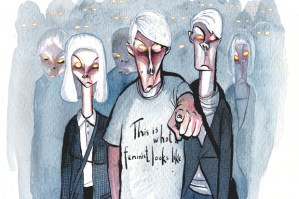In a recent column, I vowed to return to a point made in passing. To refresh your memory, the American magazine the Nation printed a formal apology for running a harmless 14-line poem by a white writer about homelessness. The poet’s sins: using the word ‘cripple’ and adopting a voice lightly evoking what I gather we’re now to call ‘AAVE’: African-American Vernacular English. Facebookers were incensed, comments huffy. The poet apologised, too.
I decried this ritual progressive self-abasement as cowardly and undignified. But it’s worth taking a second look at that story as a prime example of screaming emotional fraudulence in the public sphere.
Employing today’s prescribed lexicon, those apologies regretted the ‘pain’, ‘harm’, and ‘offence’ this sad-ass little poem had caused to stricken communities. But let’s get real. None of those poetry readers felt any pain. (Remember pain, actual pain? Drop a brick on your foot in sandals. Yeah. That’s ‘pain’.) No one suffered any harm — either tangible or psychic. Why, I wager that those irate chiders in the peanut gallery were no more genuinely offended than the magazine editors doing damage control were genuinely sorry.
What is the real emotional experience of pouncing on minor infractions of rules right-on activists seem to be making up as they go along, and which only proliferate and grow more exacting the more cravenly the rest of us obey the last ones? (The latest: ‘stay in your lane’, or ‘white writers shalt not use AAVE’.) Nothing short of exhilaration. Crusaders relish locating another paper dragon to slay. In the guise of suffering and woundedness, the overriding emotion in call-out culture is a sensation of triumph.
Radiating rapidly from campuses into the larger polity, the noble defence of an infinitely multiplying list of ‘marginalised groups’ is a predatory movement. Prowling the cultural veldt for givers of ‘offence’ is a blood sport, and its pleasures are those of hunting: spotting your prey, stalking, going in for the kill. Any source of umbrage thus presents an exulting opportunity to score a trophy, stuff it, and hang it on your (Facebook) wall. Mainstream institutions straining to be with-it give credence to this pretence of injury and vulnerability, when no one’s feelings actually have been hurt. So the victory is two-pronged. You take down the sinner, and you humiliate the editors of the Nation by forcing them to participate in an emotional theatre that every-one knows is fake.
I don’t buy into the notion that the ‘snowflake’ generation is all that sensitive, either. Antifa protestors in balaclavas can be quite violent for little specks that melt. ‘Snowflakes’ may have induced institutions to employ the language of fragility, but I think a lot of these kids are tough as old boots.
For verification, check out the YouTube video from last summer of a liberal biology professor at Evergreen State College in Washington being shouted down and physically hounded by a crowd of students crazed with virtue over a difference of opinion regarding the university’s race-related Day of Absence (‘Hey, hey! Ho, ho! Bret Weinstein has got to go!’). Behold, a pack of hyenas. Campus police told Weinstein they couldn’t guarantee his safety on campus. Obliged to hold his classes 30 miles away, at length the professor was successfully forced from the faculty.
Despite youth’s reputed belief in the importance of being earnest, the whole ID politics movement is emotionally disingenuous. When during that Evergreen foofaraw a rabid convocation of students cowed the college president into lowering his arms at the podium because they found his hand gestures ‘threatening’, those students didn’t feel jeopardised; they were dominating and emasculating a man supposedly in authority. The students cowering in ‘safe spaces’ don’t feel endangered; they’re claiming territory. In protecting the faux-helpless from noxious opinions via no-platforming, they’re exercising power. The experience of exercising power isn’t scary, except on the receiving end; it’s supremely gratifying. These people aren’t frightened. They want you to be frightened of them. And we’re not talking ‘microaggression’. PC police often prefer macroaggression, the kind that can get people sacked.
I’d never indict a whole generation for rampant emotional insincerity. But the shrillest millennial missionaries are generally middle- to upper-middle class, often themselves white, raised by parents who wanted to be their best friends, and if not outright spoiled, they are accustomed to getting their way. They’re competitive with their parents’ generation and each other. They want to take over the world (oh, didn’t we all?). The majority-white mob that sanctimoniously pulled down a Confederate memorial bronze called ‘Silent Sam’ on the campus of the University of North Carolina at Chapel Hill a few days ago — whatever you think of the Civil War monuments controversy, criminal destruction of public property, and a test of how much the protesters could get away with — don’t seem to deserve that reputation for delicacy.
Conservatives can be disingenuous, too — high-mindedly defending the health of the economy by protecting ‘wealth creators’, when they just want to pay lower taxes. Politicians of every stripe falsify passion to get elected. At least the proper hard right gets credit for emotional honesty. Stormfront and Altright.com are nasty, ugly and bigoted, and don’t pretend to be otherwise.
Yet progressives seem especially prone to disguise one feeling as another. Reliably entwined with self-deceit, the problem isn’t solely among the young. When American liberals my age claim to suffer from white guilt over slavery and the slaughter of Indians, I question whether they really feel guilty. They weren’t personal agents of these crimes, and they know it. Nothing wrong with being historically aware. But white guilt is often a blind for moral vanity.
We keep hearing about the terrible ‘distress’ caused by, say, a Canadian production that uses whites to sing slave songs, or a straight actor playing a trans role. But bullies on the left ply weakness to conceal aggression, and today’s torrent of touchiness is bogus. No one’s truly in distress. No one’s feelings are hurt really. This stuff is all about pushing other people around.
This article was originally published in The Spectator magazine.


















